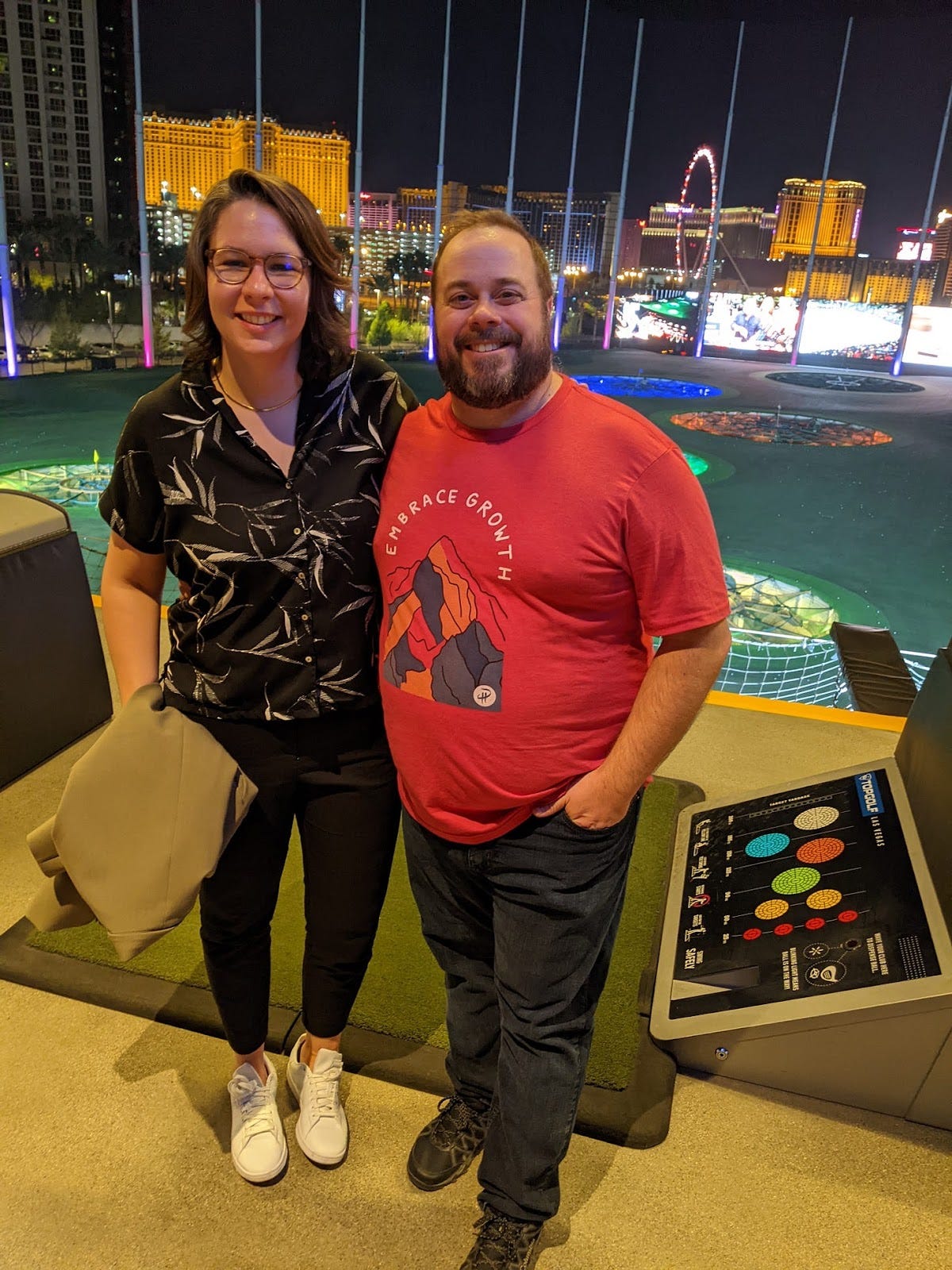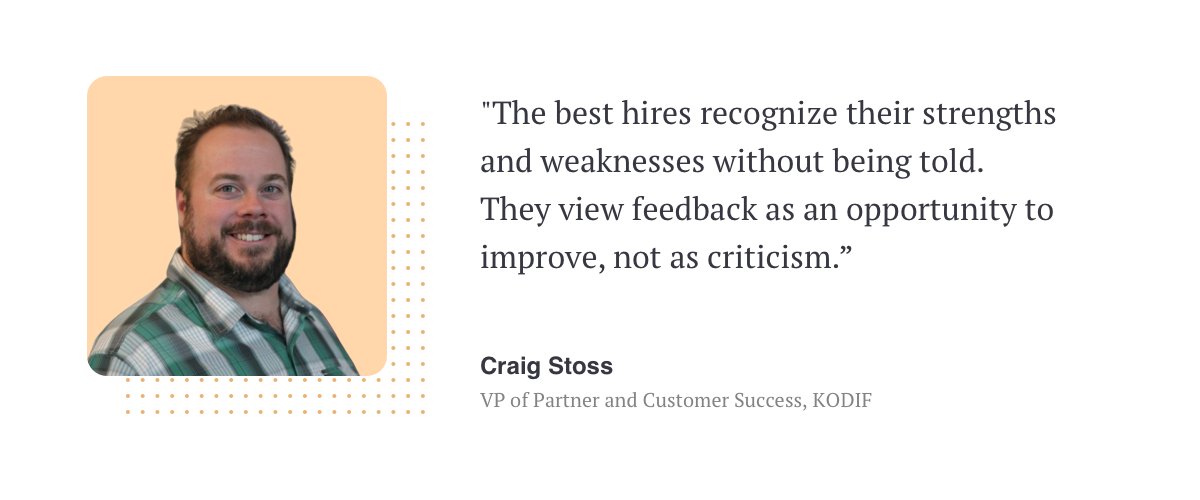When I started planning this Expert Chat series, Craig Stoss was at the top of my list.
If you work in Customer Experience, you've probably come across Craig’s work in some shape or form. Whether it's through a webinar, a thought-provoking article, or a podcast interview, Craig is everywhere — and for good reason.
Currently the VP of Partner and Customer Success at KODIF, Craig has an impressive background and he’s one of the sharpest minds in the CX space. With years of experience in support, partnerships, and operations, Craig has led teams, mentored countless professionals, and developed a deep understanding of what it takes to build a successful career in customer experience.
I first met Craig a few years back at a Support Driven event in Las Vegas, and I can personally vouch that he's just as brilliant in person as he is online. Also, he’s excellent at Topgolf! 😊

The One Skill That Sets Candidates Apart
Hiring managers look for many different qualities in job seekers, but for Craig, one skill stands out above the rest: self-awareness.

Research from Harvard Business Review supports this, showing that self-awareness is a top predictor of leadership success. People who can acknowledge mistakes and adjust quickly tend to grow faster in their careers. In customer experience, this skill helps professionals navigate challenging conversations and continuously refine their approach.
But while self-awareness is a top predictor of success, it's surprisingly difficult to measure in an interview. This is why Craig likes to ask candidates to describe how they’ve handled mistakes.
Sounds easy enough, right? However, let’s think about what Craig is actually looking for in the response to this question.
A strong response doesn’t just acknowledge a past mistake. It shows accountability, learning, and a clear process for making things right.
The best candidates don’t just say, “I made a mistake, and I fixed it.” They articulate:
- What they learned from the experience
- How they implemented change
- How that change improved outcomes in the long run
This skill is especially important in customer support, where handling tough interactions is part of the job. Someone who lacks self-awareness might make the same mistakes repeatedly or struggle to adapt to feedback.
But someone who actively reflects on their approach will constantly refine their communication, problem-solving, and collaboration skills. And this is what will make them a much stronger hire.
If you’re preparing for an interview, practice telling stories that showcase self-awareness and growth. Use a framework like STAR (Situation, Task, Action, Result) to structure your answers clearly.
Instead of:
“I once miscommunicated with a customer, which caused some frustration. I apologized, and we resolved it.”
Try:
"A few months into my last role, I realized I had a habit of assuming what customers needed before fully understanding their situation. One time, I suggested a fix too quickly, and it turned out I misunderstood their request, causing some frustration. After that experience, I made a habit of asking clarifying questions upfront, which led to better resolutions and fewer back-and-forth interactions. Later, I even trained my team on this approach, and we saw a 15% drop in escalations."
This response shows self-awareness, growth, and impact.
📌 Takeaway: Employers want adaptable professionals who learn from experience. Practice telling these stories to show how you reflect on past challenges and use feedback to evolve.
Get access to expert advice:
The ‘So What?’ Test for Resumes
Craig shared a simple but powerful trick for writing a strong resume: the ‘So What?’ test.
You can think of this as a framework to help you rephrase your work experience into powerful impact statements. Every bullet point on your resume should pass this test.
- “I handled customer tickets” → So what? Everyone in support does that.
- “I reduced response time by 30% by improving internal documentation and macros.” → Great! That’s something hiring managers care about.
Hiring managers want to see real value. If you’re job hunting, look at every line on your resume and challenge it: Would this impress you if you were hiring? If not, rewrite it to highlight your specific impact and contributions.
Use the 'So What?' framework to transform generic responsibilities into compelling impact statements by answering three key questions:
- What did I do?
- Basic task or responsibility
- Example: "Managed customer support tickets"
- How did I do it differently?
- Unique approach or method
- Example: "Developed a new internal documentation system"
- What was the measurable impact?
- Quantifiable result that demonstrates value
- Example: "Reduced average response time by 30%"
Final Result: “Developed a new internal documentation system that reduced average support ticket response time by 30%, improving customer satisfaction scores.”
If you can't answer all three questions, your bullet point needs work. Each line should tell a story of problem-solving, efficiency, and tangible impact.
It’s okay if you don’t have data for every single bullet point. You can still show your impact in other ways:
Some examples:
- Reasonable Ranges: "Improved customer satisfaction by approximately 15-20%"
- Highlight Process Improvements: "Streamlined customer onboarding process, reducing complexity and potential friction points"
- Comparative Language: "Significantly reduced ticket resolution time compared to team benchmarks"
- Soft Outcomes: "Developed cross-team communication protocol that enhanced collaboration and knowledge sharing"
- Qualitative Feedback: "Received consistent positive feedback from team leads about proactive problem-solving approach"
This approach aligns with research from LinkedIn, which found that resumes with quantified achievements get more responses than those that only list responsibilities.
If you’re job hunting, look at every line on your resume and ask yourself, “Would this impress me if I were hiring?”
If not, rewrite it to show the impact you had.
📌 Takeaway: Make your resume about outcomes, not just duties. Hiring managers want to see proof of impact.
The Future of Customer Support: From Problem-Solving to Strategy
Craig believes the support landscape is fundamentally shifting. Teams will be expected to move beyond just solving problems and become trusted advisors to customers.

This means support roles are transforming from transactional interactions to strategic partnerships that contribute directly to customer success and revenue generation.
According to Craig, "Support is blending into success, and success is blending into strategy.”
If you work in customer support, you’ll need to deeply understand the industry you’re working in, the product you’re supporting, and the unique challenges your customers face. If you’re in FinTech, you should understand how trading works. If you’re in SaaS, you need to know the product inside and out.
As the traditional entry-level support position disappears, the most successful teams will invest in continuous learning, adaptability, and broad business understanding.
With AI handling routine inquiries, companies will start looking for customer support professionals who can navigate complex customer challenges, provide proactive recommendations, and offer meaningful solutions that extend beyond immediate problem resolution.
Instead of just responding to questions, support teams will play a bigger role in customer success, retention, and even revenue generation.
For those entering the field, this shift is both a challenge and an opportunity. Future-proofing your career in CX will require building expertise beyond technical skills. You’ll need to demonstrate your critical thinking skills, industry knowledge, and the ability to provide strategic guidance.
📌 Takeaway: Become a strategic advisor, not just a problem solver. Your value lies in expertise, insight, and proactive solutions.
Final Thoughts: Making Support a Real Career
Craig’s journey to leadership roles highlights an important lesson for anyone in the customer experience space: adaptability and strategic thinking matter more than ever.
Craig’s parting advice is simple but powerful:
- Treat every role as an opportunity to learn and evolve.
- Focus on measurable impact—your ability to solve problems and drive results will set you apart.
- Recognize that support is not just about fixing issues; it’s about creating long-term value for customers and businesses alike.
Customer support can be a path to influence, leadership, and meaningful impact. The best careers in CX are built on curiosity, adaptability, and a focus on value.
Many companies still treat support as a cost center rather than a strategic function. But research from Forrester shows that companies with high-quality customer service grow revenue 5-10% faster than those that don’t.
Businesses that understand this will create better career paths for support professionals, making it a long-term career rather than just a job.
Embrace the evolution of support and you’ll be ahead of the curve! 😉
Get access to expert advice:
📌 Don’t miss our upcoming editions!
Subscribe to get access to advice from these experts:
→ Jess Coppinger, Senior Manager of Customer Support at beehiiv
→ Robert Cabral, Head of Customer Support at Runway
→ Daphne Costa, Global Director of Customer Success at HubSpot
→ Mercer Smith, VP, Community + Education at PartnerHero
→ Kenji Hayward, Senior Director of Customer Support at Front
→ Philippe Lima, Global Director, Customer Onboarding & Key Account Management at Aircall
→ and more…